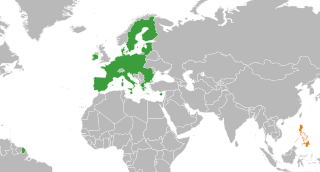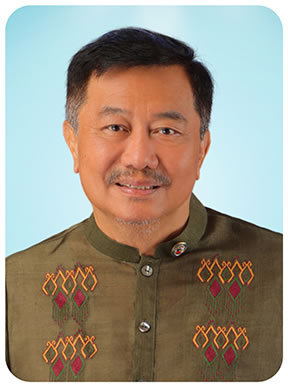
Davao City, officially the City of Davao, is a highly urbanized city in the Davao Region, Philippines. The city has a total land area of 2,443.61 km2 (943.48 sq mi), making it the largest city in the Philippines in terms of land area. It is the third-most populous city in the Philippines after Quezon City and Manila, and the most populous in Mindanao. According to the 2020 census, it has a population of 1,776,949 people.
Human rights in the Philippines are protected by the Constitution of the Philippines, to make sure that people in the Philippines are able to live peacefully and with dignity, safe from the abuse of any individuals or institutions, including the state.

Rodrigo Roa Duterte, also known as Digong, Rody, and by the initials DU30 and PRRD, is a Filipino lawyer and politician who served as the 16th president of the Philippines from 2016 to 2022. He is the chairperson of Partido Demokratiko Pilipino, the ruling political party in the Philippines during his presidency. Duterte is the first president of the Philippines to be from Mindanao, and is the oldest person to assume office, beginning his term at age 71.
The Davao Death Squad (DDS) is a vigilante group in Davao City, Philippines. The group is alleged to have conducted summary executions of street children and individuals suspected of petty crimes and drug dealing. It has been estimated that the group is responsible for the killing or disappearance of between 1,020 and 1,040 people between 1998 and 2008. The 2009 report by the CHR noted stonewalling by local police under Duterte while a leaked cable observed a lack of public outrage among Davao residents.

Extrajudicial killings and forced disappearances in the Philippines are illegal executions – unlawful or felonious killings – and forced disappearances in the Philippines. These are forms of extrajudicial punishment, and include extrajudicial executions, summary executions, arbitrary arrest and detentions, and failed prosecutions due to political activities of leading political, trade union members, dissident or social figures, left-wing political parties, non-governmental organizations, political journalists, outspoken clergy, anti-mining activists, agricultural reform activists, members of organizations that are alleged as allied or legal fronts of the communist movement or claimed supporters of the NPA and its political wing, the Communist Party of the Philippines (CPP). Other frequent targets are ancestral land rights defenders, Indigenous rights activists, environmentalists, and human rights workers.

An extrajudicial killing is the deliberate killing of a person without the lawful authority granted by a judicial proceeding. It typically refers to government authorities, whether lawfully or unlawfully, targeting specific people for death, which in authoritarian regimes often involves political, trade union, dissident, religious and social figures. The term is typically used in situations that imply the human rights of the victims have been violated; deaths caused by legal police actions or legal warfighting on a battlefield are generally not included, even though military and police forces are often used for killings seen by critics as illegitimate. The label "extrajudicial killing" has also been applied to organized, lethal enforcement of extralegal social norms by non-government actors, including lynchings and honor killings.
Patricia Chanco Evangelista is a Filipina trauma journalist and documentary filmmaker based in Manila, whose coverage focuses mostly on conflict, disaster and human rights. She is a multimedia reporter for online news agency Rappler and is a writer-at-large for Esquire magazine. Her first book, Some People Need Killing, came out in 2023.

The European Union and the Philippines share diplomatic, economic, cultural and political relations. The European Union has provided millions of euros to the Philippines to fight poverty and counter-terrorism against terrorist groups in the Southern Philippines. The European Union is also the third largest trading partner of the Philippines. There are more than 30,000 Europeans living in the Philippines not including Spaniards.
Juan Pajadora Pala Jr., more widely known as Jun Porras Pala, was a Filipino journalist, columnist and pundit who worked for DXGO. Pala was mostly known for his extensive work exposing corrupt politicians from the southeastern Davao City, Davao Region, Philippines. Pala was the target of three assassination attempts before he was killed on September 6, 2003.

Ronald Marapon dela Rosa, also known as Bato, is a Filipino politician and retired police officer who is currently serving as a senator of the Philippines since 2019. He served under the Duterte administration as the chief of the Philippine National Police from July 1, 2016, to April 19, 2018, overseeing the government's anti-drug campaign; he also served as the Director General of the Bureau of Corrections from April 30 to October 12, 2018.

Pantaleon Diaz Alvarez is a Filipino lawyer and politician serving as the Representative of Davao del Norte's 1st district since 2016, previously holding the position from 1998 to 2001. He served as the Speaker of the House of Representatives from 2016 to 2018. He also served as the Secretary of Transportation and Communications in the Cabinet of President Gloria Macapagal Arroyo from 2001 to 2002.

The Philippine drug war, known as the War on Drugs, is the intensified anti-drug campaign that began during the administration of President Rodrigo Duterte, who served office from June 30, 2016, to June 30, 2022. The campaign reduced drug proliferation in the country, but has been marred by extrajudicial killings allegedly perpetrated by the police and unknown assailants. By 2022, it is estimated by human rights organizations that more than 20,000 civilians have been killed in "anti-drug operations" carried out by the government and its supporters.
Edgar Bernal Matobato is a self-confessed hitman who claims to be a former member of the Davao Death Squad or the "DDS", an alleged vigilante group tasked to summarily execute suspected criminals.

Rolando Rosal Espinosa, the mayor of Albuera, Leyte, died on November 5, 2016, at the Baybay City Provincial Jail. He was detained at the jail due to his arrest for illegal drug possession in October 2016. According to the Criminal Investigation and Detection Group (CIDG), Espinosa was killed during a shootout that he initiated when the CIDG came to the jail to serve him a search warrant. Espinosa's death occurred amid allegations that he was involved in the drug trade by President Rodrigo Duterte, who initiated the Philippine Drug War intending to kill criminals using or distributing drugs. The Commission on Human Rights and Karapatan have held Duterte accountable for Espinosa's death, with Senate condemning the death as an instance of extrajudicial killing.

Catalino "Lito" Salandanan Cuy is a Filipino retired police director and current chairman of the Dangerous Drugs Board under the Duterte administration and Marcos administration. He assumed the role of acting Secretary of the Interior and Local Government on April 5, 2017, upon the departure of Ismael Sueno who was dismissed by President Duterte following corruption allegations.

Vicente "Vic" Dupa Danao Jr. is a Retired Filipino law enforcement officer and former Commander of Area Police Command-Western Mindanao. Danao has been with the Philippine National Police for over 29 years and has served as Officer-in-Charge of the Philippine National Police from May to August 2022, Deputy Chief for Operations, Chief of the National Capital Region Police Office from 2020 until 2022, deputy director for operations of the Criminal Investigation and Detection Group, as task force commander under the Inter-Agency Committee on Anti-Illegal Drugs, and as chief of police in two cities and two regions. His longest term as police chief was between October 2013 and June 2016 in Davao City.

The International Criminal Court investigation in the Philippines, or the situation in the Republic of the Philippines, is an ongoing investigation by the International Criminal Court (ICC) into alleged crimes against humanity committed during the Philippine drug war.
The first 100 days of Rodrigo Duterte's presidency began on June 30, 2016, the day Rodrigo Duterte was inaugurated as the 16th president of the Philippines. The concept of the first 100 days of a presidential term was first adopted in the Philippines by President Corazon Aquino from the United States and has since been used as a gauge of presidential success and activism, and is a considered the "honeymoon period" where traditional critics are urged to refrain from detracting the new president. The 100th day of his presidency ended at noon on October 8, 2016.
The following article details the reactions, both local and international, to the Philippine drug war.
The Alsa Masa was a rightwing vigilante group in the Philippines initially formed in early 1984 specifically to combat the New People's Army in Barangay Agdao, Davao City. It was then later revived and expanded in April 1986 with the support of the Philippine Constabulary's Davao Metro District Command. It was created at a time when the NPA was still experimenting with approaches like urban insurrectionism, creating an atmosphere of extreme violence in Mindanao. However, Alsa Masa itself was soon noted to also be a perpetrator of numerous human rights violations, creating a cycle of violence in the locality. Many of Alsa Masa's members were later recruited into the Civilian Armed Forces Geographical Units which the Philippine government created in July 1987.












